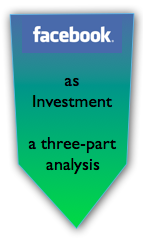
 Facebook As Investment: How Trust Issues Block Its Best Path to Wealth describes why Facebook needs to change its orientation to users to unlock its full wealth potential. Over the past month, it has been de rigeur to comment on Facebook’s IPO and “quality” as an investment, but I decided to hold back until I could free a window to consider the matter in sufficient detail. The result is the “Facebook As Investment” trilogy, of which this is the first part. Part Two analyzes Facebook-the-platform’s investment prospects. Part Three advises executives on how to isolate their social business investments from Facebook business risks. Facebook As Investment: How Trust Issues Block Its Best Path to Wealth describes why Facebook needs to change its orientation to users to unlock its full wealth potential. Over the past month, it has been de rigeur to comment on Facebook’s IPO and “quality” as an investment, but I decided to hold back until I could free a window to consider the matter in sufficient detail. The result is the “Facebook As Investment” trilogy, of which this is the first part. Part Two analyzes Facebook-the-platform’s investment prospects. Part Three advises executives on how to isolate their social business investments from Facebook business risks.
I did not buy into Facebook and do not plan to invest in its stock. I think it is a fantastic social venue and platform in which to connect with people (“stakeholders,” friends, associates..)—personally and for enterprises and brands. However, as I’ll argue here, Facebook‘s Achilles heel is a significant trust gap with most of its stakeholders. Its trust gap will make it difficult for Facebook management to fully […]
 The B2B Executive’s How-to Guide to Social Business is an executive primer on developing B2B relationships much faster and cheaper. The B2B Executive’s How-to Guide to Social Business is an executive primer on developing B2B relationships much faster and cheaper.
If you have been on several “social media” platforms as a firm or individual for some time but feel that you’re barely scratching the surface, this guide will help you boost your results significantly because: its goal is to help you develop B2B relationships more efficiently, instead of “selling” yourself and it shows you how to use B2B-oriented platforms in concert to increase leverage. If you would like some background on the profound distinction between “selling” yourself and focusing on relationship, “Social Business Disruption of B2B Sales & Marketing” crystallizes it in 8 minutes.
[…]
 This Executive’s Guide to Blogging offers executives a pragmatic, conservative approach to blogging. For years, now, I have beseeched all the executives and “knowledge workers” I know (that’s thousands) to blog, so please consider this as part of that campaign—with benefits (because this is a how-to post). Here’s why: In the Knowledge Economy’s pervasive digital networks, you are invisible unless you come across people’s screens regularly. And, while you are invisible, your potential business partners are seeing people who do flit across their screens. If you aren’t there, you are in a bloody ocean that gets smaller every year. Don’t stay in, the water is not fine. Please understand that I’m stating this as a simple fact. I’m sure you’ve read books like The Long Tail, which describe how we are all publishers now, that is, those of us who decide to use the free tools at our disposal. This Executive’s Guide to Blogging offers executives a pragmatic, conservative approach to blogging. For years, now, I have beseeched all the executives and “knowledge workers” I know (that’s thousands) to blog, so please consider this as part of that campaign—with benefits (because this is a how-to post). Here’s why: In the Knowledge Economy’s pervasive digital networks, you are invisible unless you come across people’s screens regularly. And, while you are invisible, your potential business partners are seeing people who do flit across their screens. If you aren’t there, you are in a bloody ocean that gets smaller every year. Don’t stay in, the water is not fine. Please understand that I’m stating this as a simple fact. I’m sure you’ve read books like The Long Tail, which describe how we are all publishers now, that is, those of us who decide to use the free tools at our disposal.
Blogging is 21st century thought leadership, which is table stakes in the Knowledge Economy. Your thoughts represent and “scale” you, so they help you to connect with people with whom […]
Using the Relationship Value Map to Optimize Your Social Networks is a step-by-step approach to prioritizing your firm’s interactions in social networks to significantly improve the return on your team’s time.

CSRA’s Relationship Value Map is a simple but invaluable tool you can use to organize your social networks to meet your personal or business goals better. Its Interest and Trust vectors intersect to create four quadrants for your connections. I designed it when working with individual executive clients in 2009, but CSRA uses it with enterprise clients as well, especially those with direct (B2B) sales forces who need to prioritize their relationship building activities.
[…]
 In An Offer You Can’t Refuse, Lydia Dishman interviews CEO Justin Moore, who discusses his business leadership “lessons learned” from watching The Godfather. It’s a solid post, but very thoughtful and insightful comments take it into classic territory. That said, the post didn’t hit the bullseye for our context here—B2B relationship building—so here goes with the pieces I think it missed. I invite you to add yours in comments. In An Offer You Can’t Refuse, Lydia Dishman interviews CEO Justin Moore, who discusses his business leadership “lessons learned” from watching The Godfather. It’s a solid post, but very thoughtful and insightful comments take it into classic territory. That said, the post didn’t hit the bullseye for our context here—B2B relationship building—so here goes with the pieces I think it missed. I invite you to add yours in comments.
[…]
 In The Ironic Truth About Sincerity, Seth Godin juxtaposes sincerity and performance, and he comments on how they influence trust. It’s a nice riff that gets one thinking, so here I’ll do a deeper dive into how these two elements of trust work together to facilitate or sabotage B2B relationships and sales. In The Ironic Truth About Sincerity, Seth Godin juxtaposes sincerity and performance, and he comments on how they influence trust. It’s a nice riff that gets one thinking, so here I’ll do a deeper dive into how these two elements of trust work together to facilitate or sabotage B2B relationships and sales.
I’ll also link to an even deeper treatment for those who want to open yet more doors.
[…]
 Facebook recently released a new control for Pages that acts like blogs’ pre-moderation setting: when a Page admin activates it, Likes’ (Fans’) “organic” posts will not appear on the Page’s Wall until an admin specifically approves them. Read on for how to decide whether to use this control with your Pages as well as my interpretation of how the new control helps to reveal Facebook’s emerging business strategy to maximize the impact of its IPO. Facebook recently released a new control for Pages that acts like blogs’ pre-moderation setting: when a Page admin activates it, Likes’ (Fans’) “organic” posts will not appear on the Page’s Wall until an admin specifically approves them. Read on for how to decide whether to use this control with your Pages as well as my interpretation of how the new control helps to reveal Facebook’s emerging business strategy to maximize the impact of its IPO.
[…]
 In Why Lie?, Seth Godin points out that prospects of (B2B) salespeople often lie because they do not want their decisions to be questioned by salespeople: “… when we announce that we’ve made the decision to hire someone else, or when we tell the pitching entrepreneur we don’t like her business model, or when we clearly articulate why we’re not going to do business, the salesperson responds by questioning the judgment of the prospect.” In Why Lie?, Seth Godin points out that prospects of (B2B) salespeople often lie because they do not want their decisions to be questioned by salespeople: “… when we announce that we’ve made the decision to hire someone else, or when we tell the pitching entrepreneur we don’t like her business model, or when we clearly articulate why we’re not going to do business, the salesperson responds by questioning the judgment of the prospect.”
Great insight, but it pre-supposes a lack of trust that is totally outdated and unnecessary. Let’s review how this comes about and how to disrupt the whole cycle.
[…]
 Private equity firms are learning that “private” can be a disadvantage in the era of digital social networks. G7 voters are frustrated by prolonged poor economic performance, falling prosperity and growing income disparities. P/E firms are an all too convenient target, and US presidential candidate Mitt Romney is bringing unwelcome exposure to the industry. There is a strong populist theme to U.S. and European politics, which sets the scene for a prolonged era of criticism, precisely when the industry is struggling, and firms are closing. Private equity firms are learning that “private” can be a disadvantage in the era of digital social networks. G7 voters are frustrated by prolonged poor economic performance, falling prosperity and growing income disparities. P/E firms are an all too convenient target, and US presidential candidate Mitt Romney is bringing unwelcome exposure to the industry. There is a strong populist theme to U.S. and European politics, which sets the scene for a prolonged era of criticism, precisely when the industry is struggling, and firms are closing.
Smart P/E firms will be grounded and strategic about building trust among lawmakers, their publics and other stakeholders, and using digital social networks could play a key role in educating stakeholders and interacting with readers with transparency and principles, thereby building trust and dampening criticism. Specifically, P/E firms should:
[…]
Steve Jobs Tribute: Behind the Fierce Competitor and Exacting Boss, the ardent desire to serve connected the creator, the visionary and the executive.
 Much has been written about Steve Jobs the creator, the technology visionary and the enterprise leader, but none of these personas entirely get to his essence. Steve Jobs was all these things, par excellence, but what deeply touched and inspired Apple’s customers and what made Steve bearable as a boss was an unconscious yet poignant feeling that he was there to serve people. He flew the flag of The Rest of Us. Unswervingly. Vehemently. Much has been written about Steve Jobs the creator, the technology visionary and the enterprise leader, but none of these personas entirely get to his essence. Steve Jobs was all these things, par excellence, but what deeply touched and inspired Apple’s customers and what made Steve bearable as a boss was an unconscious yet poignant feeling that he was there to serve people. He flew the flag of The Rest of Us. Unswervingly. Vehemently.
Without this higher calling, Steve would have been merely a successful tyrant. However, Steve’s commitment compelled thousands of brilliant and highly intelligent people to work for him and millions of customers to feel that Apple stood for something rare. Beige boxes and senseless software are optimized for profit, but Steve loathed mediocrity and its inherent compromises because they didn’t serve people, they acted at the expense of people. The desire to serve drove Steve Jobs, the creator, the leader and the innovator. Steve would […]
|
|

 Facebook As Investment: How Trust Issues Block Its Best Path to Wealth describes why Facebook needs to change its orientation to users to unlock its full wealth potential. Over the past month, it has been de rigeur to comment on Facebook’s IPO and “quality” as an investment, but I decided to hold back until I could free a window to consider the matter in sufficient detail. The result is the “Facebook As Investment” trilogy, of which this is the first part. Part Two analyzes Facebook-the-platform’s investment prospects. Part Three advises executives on how to isolate their social business investments from Facebook business risks.
Facebook As Investment: How Trust Issues Block Its Best Path to Wealth describes why Facebook needs to change its orientation to users to unlock its full wealth potential. Over the past month, it has been de rigeur to comment on Facebook’s IPO and “quality” as an investment, but I decided to hold back until I could free a window to consider the matter in sufficient detail. The result is the “Facebook As Investment” trilogy, of which this is the first part. Part Two analyzes Facebook-the-platform’s investment prospects. Part Three advises executives on how to isolate their social business investments from Facebook business risks.
 The B2B Executive’s How-to Guide to Social Business is an executive primer on developing B2B relationships much faster and cheaper.
The B2B Executive’s How-to Guide to Social Business is an executive primer on developing B2B relationships much faster and cheaper. This Executive’s Guide to Blogging offers executives a pragmatic, conservative approach to blogging. For years, now, I have beseeched all the executives and “knowledge workers” I know (that’s thousands) to blog, so please consider this as part of that campaign—with benefits (because this is a how-to post). Here’s why: In the Knowledge Economy’s pervasive digital networks, you are invisible unless you come across people’s screens regularly. And, while you are invisible, your potential business partners are seeing people who do flit across their screens. If you aren’t there, you are in a bloody ocean that gets smaller every year. Don’t stay in, the water is not fine. Please understand that I’m stating this as a simple fact. I’m sure you’ve read books like The Long Tail, which describe how we are all publishers now, that is, those of us who decide to use the free tools at our disposal.
This Executive’s Guide to Blogging offers executives a pragmatic, conservative approach to blogging. For years, now, I have beseeched all the executives and “knowledge workers” I know (that’s thousands) to blog, so please consider this as part of that campaign—with benefits (because this is a how-to post). Here’s why: In the Knowledge Economy’s pervasive digital networks, you are invisible unless you come across people’s screens regularly. And, while you are invisible, your potential business partners are seeing people who do flit across their screens. If you aren’t there, you are in a bloody ocean that gets smaller every year. Don’t stay in, the water is not fine. Please understand that I’m stating this as a simple fact. I’m sure you’ve read books like The Long Tail, which describe how we are all publishers now, that is, those of us who decide to use the free tools at our disposal.
 In An Offer You Can’t Refuse, Lydia Dishman interviews CEO Justin Moore, who discusses his business leadership “lessons learned” from watching The Godfather. It’s a solid post, but very thoughtful and insightful comments take it into classic territory. That said, the post didn’t hit the bullseye for our context here—B2B relationship building—so here goes with the pieces I think it missed. I invite you to add yours in comments.
In An Offer You Can’t Refuse, Lydia Dishman interviews CEO Justin Moore, who discusses his business leadership “lessons learned” from watching The Godfather. It’s a solid post, but very thoughtful and insightful comments take it into classic territory. That said, the post didn’t hit the bullseye for our context here—B2B relationship building—so here goes with the pieces I think it missed. I invite you to add yours in comments. Much has been written about Steve Jobs the creator, the technology visionary and the enterprise leader, but none of these personas entirely get to his essence. Steve Jobs was all these things, par excellence, but what deeply touched and inspired Apple’s customers and what made Steve bearable as a boss was an unconscious yet poignant feeling that he was there to serve people. He flew the flag of The Rest of Us. Unswervingly. Vehemently.
Much has been written about Steve Jobs the creator, the technology visionary and the enterprise leader, but none of these personas entirely get to his essence. Steve Jobs was all these things, par excellence, but what deeply touched and inspired Apple’s customers and what made Steve bearable as a boss was an unconscious yet poignant feeling that he was there to serve people. He flew the flag of The Rest of Us. Unswervingly. Vehemently.